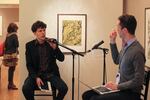
The actor and author Jesse Eisenberg talking with Aaron Scott at a pop-up stage in the print gallery of the Portland Art Museum during Wordstock.
Reuben Unrau / OPB
Jesse Eisenberg is best known for starring in movies like “The Social Network,” “Zombieland” and next year's "Batman v. Superman." But he’s quickly gaining attention for his writing as well, in the form of both plays and humor.
In 2015 alone, Eisenberg starred in three films, spent two months acting in an award-winning off-Broadway play of his own writing, and released his first book, “Bream Gives Me Hiccups & Other Stories." It takes its name from a series of restaurant reviews he penned for the “New Yorker” from the perspective of a privileged child.
Eisenberg recently spoke with OPB at Literary Arts' Wordstock. Listen to the full interview above, including Eisenberg reading two selections from "Bream Gives Me Hiccups & Other Stories." These are just a few of the high spots:
- On why he started writing: "What's so great about it is you could to it at any point. I'd do it on weekends of movies or when I had time off. Acting, for me, always feels like being a drummer. It's a fun skill to have, but you can't do it on your own. So writing is kind of like playing the guitar. It's as much fun to do on your own as it is to enjoy with other people."
- On hatching the idea for the titular stories in the collection, "Bream Gives Me Hiccups," in which a rich boy tags along with his recently-divorced mother through a series of fancy restaurants: "I took my girlfriend for one of our anniversaries to a fancy restaurant — Nobu Malibu, in California — and sitting next to us was a family with kids. And one of the kids, this little girl, she kept asking her mother, 'Mommy, do I like hamachi?' And the mom was, like, 'No, honey, that's yellowtail.' And the little girl asked, 'Do I like tamago?' 'Mm-m, no you don't.'
"I just thought there was something so funny about this little girl who knew all about this stuff. And I thought it would be funny to write a series of restaurant reviews from a perspective of a rich kid who just wants to eat animal crackers but is forced because of their economic status to eat really interesting things they don't like because they haven't developed that palate.
"I was able to mix something very heartbreaking and very funny, and I discovered that fusing both increased the effect of each one." On what appealed to him about writing from the perspective of children and young adults: "The boy has a line — which I wrote, but I'll attribute to him for the sake of modesty — where he says that he likes being a child because children think more like themselves, whereas adults, having been with each other much longer, think more like each other.
"Kids' bluntness is profound because they see the truth of things. They can cut through the hypocrisy, the little ways we falsely socialize with each other just to get through a day. Kids don't really do that.
"Children are like immigrants to Earth. In my plays, I always have a character who is not an American. My last play was about a Nepalese immigrant, which I based on a guy I know, and the one before that was about a Polish woman, and the first one was abut a Filipino girl. But when I'm writing first person, the only people I can use that have fresh perspectives are young people. Or naïve adults."- On what his day job lent to his process in creating short stories: "As an actor, you're trained to look for the emotional experience underneath. It sounds kind of trite or self-aggrandizing or pretentious to attribute great emotional depth to a marriage counselor at a Knicks' game. But there actually would be something; he'd be embarrassed, he'd be struggling against his own instinct. And so I put that in there. That's the actor part of me saying, 'Don't just make jokes. Make sure this person can exist outside this particular scenario.'"
- On how his OCD affects his writing: "It just makes it really inefficient, because before I can turn my computer on, I have to touch each part of it. It's just annoying. There's nothing, there's no value added to walking down the street and trying not to step on cracks."
